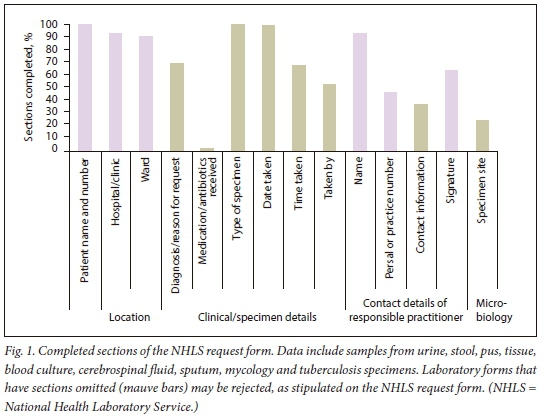Services on Demand
Article
Indicators
Related links
-
 Cited by Google
Cited by Google -
 Similars in Google
Similars in Google
Share
SAMJ: South African Medical Journal
On-line version ISSN 2078-5135
Print version ISSN 0256-9574
SAMJ, S. Afr. med. j. vol.108 n.7 Pretoria Jul. 2018
http://dx.doi.org/10.7196/samj.2018.v108i7.13363
CORRESPONDENCE
Completing laboratory request forms diligently - when did it become optional?
To the Editor: Working in a microbiology laboratory has given me a new perspective on completing laboratory forms thoroughly. Diligent completion of these forms shows care and conscientiousness in one's duties and ensures the correct processing of a hard-earned biopsy taken by the surgeon in theatre. Unfortunately, we as laboratory personnel see poorly completed forms daily and have to phone out unlabelled specimens to senior doctors routinely.
Fig. 1 tells the story of these uncompleted forms. These data were captured from 621 National Health Laboratory Service request forms, which include all specimen types received in one day. Only 37% of the practitioners included their contact information, making it very difficult to communicate critical results. Furthermore, only 25% of the laboratory request forms had a specimen site indicated, an important factor to consider when selecting the conditions and media to culture samples. The diagnosis and reason for the investigation were not entered by almost a third of the responsible practitioners, which makes it difficult to place preliminary results into context. Not one of the laboratory forms was completed with all the requested sections filled in. Only 14 samples were rejected by our laboratory (6 leaked, 3 were unsuitable for the test requested, 3 were unlabelled, 1 sample was placed in the wrong container, and in 1 case information on the form did not match that of the sample). The problem is not so much the lack of completeness, but that samples are rejected when a sample cannot be correctly attributed. It is the patient who must carry the burden of lost samples and our health system that must carry the financial strain. On the other hand, accepting specimens with unknown collection dates or no specimen type indicated may result in non-conformance when undergoing external laboratory accreditation processes. This can jeopardise the soundness of these results if processed and sent out by our laboratory. If we were to reject all samples with incomplete forms, this would mean rejecting at least 56% of the request forms, as no persal or practice number was entered for those samples.

This issue needs to be addressed at medical school and intern level, so that completing the forms correctly is second nature.
C J Opperman
Division of Medical Microbiology, National Health Laboratory Service, University of Cape Town and Groóte Schuur Hospital, Cape Town, South Africa. stefanoppermanl@gmail.com














